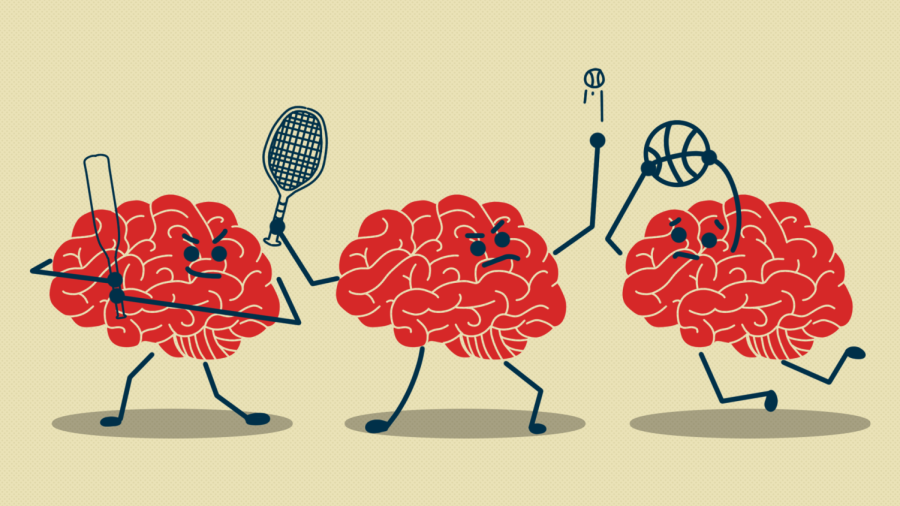Sports x News: Mental Health and College Athletes
(Design by Madelyn Foulger | The Daily Utah Chronicle)
December 31, 2022
Taking the right steps to maintain positive mental health is vital to athletes being successful in their athletic, academic and personal lives.
Amelia Van Der Werff is a junior on the University of Utah’s volleyball team who shared her experience with mental health as an athlete.
Van Der Werff transferred from Middle Tennessee State, an experience that she explained “took a toll” on her mental health. She was not fully aware of the impacts of sports on mental health, and she felt she was “on [her] own trying to figure it out” throughout the year. However, once she transferred to the U she found that the university’s resources, such as sports psychologists and tutors, helped her mental health improve drastically.
In his more than 20 years as a psychiatrist, Jason Hunziker has worked with athletes from all age ranges, most recently as a consultant for the Utah Jazz Team. He also is a psychiatrist at the Huntsman Mental Health Institute.
“I would say college athletes in general, probably have more mental health concerns than, let’s say, non-athletes that are going to college and non-college students,” Hunziker said
He listed many reasons why this is so disproportionate, mainly stemming from high anxiety and stress levels. These included injuries, immense pressure, a highly regimented schedule, keeping their scholarships and competitiveness.
On top of volleyball, Van Der Werff and other student athletes have to balance the stresses of being a college student, which include academics and interpersonal relationships. She manages stress through reliance on her family, especially her sister, who also plays volleyball.
The team aspect of the sport has also been a great blessing to Van Der Werff. She shared that she is “really blessed to have the teammates” that she does, as they have weekly meetings and accountability partners to ensure they are staying on top of school and maintaining strong mental health.
Connecting athletes with resources, such as sports psychologists, has been a tremendous help to Van Der Werff.
“We have coaches’ meetings and they ask us how we are doing mentally,” Van Der Werff said. “Yesterday we had a sports psychologist come in … and talk to us about our mental game. They are very big on making sure that we are all doing well.”
Van Der Werff recently joined a group called Unmuted Utah that focuses on athletes talking about mental health. Her goal is to “break the barrier” and open up conversations about mental health.
“There’s a stigma around athletes’ mental health,” Van Der Werff said. “It seems glorious, like you get all the gear and get to play — which it is and it’s an amazing opportunity — but I think there is a lot that goes on behind the scenes that isn’t usually noticed. Letting athletes realize that it’s okay to go through mental stuff and making people know the resources we have [is vital].”
Hunziker recommends any student, or student athletes in particular, who are struggling with their mental health talk to someone, whether it be a friend, coach or trainer.
There are many resources on campus like the Student Counseling Center, Wellness Center, the Huntsman Mental Health Institute or a national crisis hotline, like 988.
He also mentioned the damaging effects that injuries such as concussions have on mental health. This also may be a reason why college athletes might suffer in silence.
“We have this huge stigma for mental health issues,” Hunziker said. “I mean, it’s pretty easy when a college athlete doesn’t play because they have a twisted ankle or some other injury, but to not play because you’re depressed is extremely difficult for somebody to say.”
Van Der Werff feels she has gone on a journey of improvement and exploration, and although it is not always perfect, she is happy with the progress she has made.
“When I look at it now, [being a college athlete] has had a positive effect on my mental health,” said Van Der Werff. “I’ve grown as a person. … In a few weeks or a month I can change the way I think about things. It’s a constant process and it’s really cool to see how much your mind plays into your sport. Where I’ve come from to now, my mental health has improved and helped me to learn who I am as a player. To learn more about myself.”










